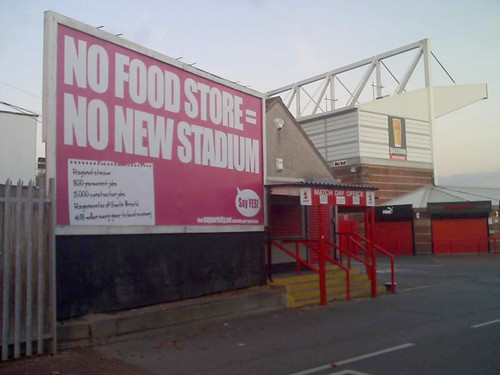Bristol City FC are ratcheting up their pretty blatant efforts to lobby members of Development Control (South and East) Committee in advance of the crucial stadium planning meeting on Wednesday. They’ve even gone and put together a little ad campaign (above).
This follows hard on the heels of the club’s Chief Executive, Colin Sexstone’s desperate public pleas from the pages of the Evening Cancer and the club’s website about their random ‘Southlands’ housing development at the back of their Ashton Vale stadium site, which has been recommended for planning refusal by city council officers.
Is Sexstone trying to use the media to bypass planning officers and talk “directly” to councillors who will be making the decision by any chance? And is he perhaps trying to persuade them to ignore the officer recommendation over the “Southlands” development?
But is talking over the heads of planning officers and directly to officially objective members of a planning committee really such a wise idea?
If this “Southlands” site is so crucial to the development and the club thought that their financial appraisals proved that, then wouldn’t the developers be confident of overturning any planning decision on appeal?
But one of the extraordinary features of this whole affair, so far, has been the ease with which Bristol City Council have allowed Lansdown and Sexstone to shroud their financial plans in absolute secrecy.
The situation is so absurd that the councillors sitting on the planning committee are being asked to make complex financial judgements on the basis of a short report of an appraisal of a business plan.
Of course, were this application to go to appeal then it would become part of a judicial process and it’s highly unlikely a member of the judiciary will share the city council’s daft view that a soppy little business plan for a crappy little housing development should be kept secret.
This means Lansdown’s controversial “financial appraisals” are likely to go into the public domain and get torn apart. Particularly as there’s a £50m disagreement over valuations implied in the officer’s report to the planning committee.
However, perhaps what the club doesn’t realise is that if the members do as the club seem to want and decide to go against their officers’ recommendation – negating the need for an all-revealing appeal – officers have made it quite clear that members can only do so on the basis of the ‘very special circumstances’ where the benefits of the stadium project clearly outweigh the harm.
The ‘very special circumstances’ for the “Southlands” housing element of the stadium project is as an ‘enabling development’ or “that it is development necessary to assist the funding of an intrinsically unviable stadium”.
This is essentially a financial consideration and if members approve it contrary to officer advice they are effectively saying that the officer’s view of the financial appraisal is flawed.
Here is some guidance on this type of ‘enabling development’ from English Heritage;
“Financial considerations are fundamental to any decision about enabling development. From this follows a need not only for financial justification to be submitted, but also for its critical assessment by appropriately qualified professionals. The local planning authority should ensure that it has sufficient information to make an informed decision upon the application. If it fails to do so, its decison may be vulnerable to judicial review, and less likely to be supported on appeal.”
“The information supplied should cover all financial aspects of the proposed enabling development, at a sufficient degree of detail to enable scrutiny and validation by the local authority and its professional advisers.”
This means that if the planning committee members go against the officer recommendation they are effectively saying that the financial assessment by their planning officers and their professional advisers is in some way flawed or that the financial information was insufficient or that the assessment was incorrect.
This then offers up the potential for judicial review in the courts and – just like an appeal – the financial appraisals will be put in the public domain.
Moreover, if a judicial review finds against the council then, it could make the council liable for damages to the developers if their decision is overturned.
The councillors on the planning committee will certainly have all been trained and fully briefed on the legal implications of their role. So it would be very surprising if they put the council at risk of being taken to judicial review and effectively get shot by both sides with a hefty bill for the pleasure.
Better to go with the officer’s recommendation and let the developers go to appeal (if they really believe their financial case is strong enough) where the decision is then made by an independent inspector and the council’s financial commitment is limited to the costs of the appeal rather than the potentially open-ended costs involved with being found guilty of maladministration at a judicial review.
Indeed, campaigners have assured the Blogger that should members disregard officer advice on Southlands then they have lawyers waiting in the wings …



